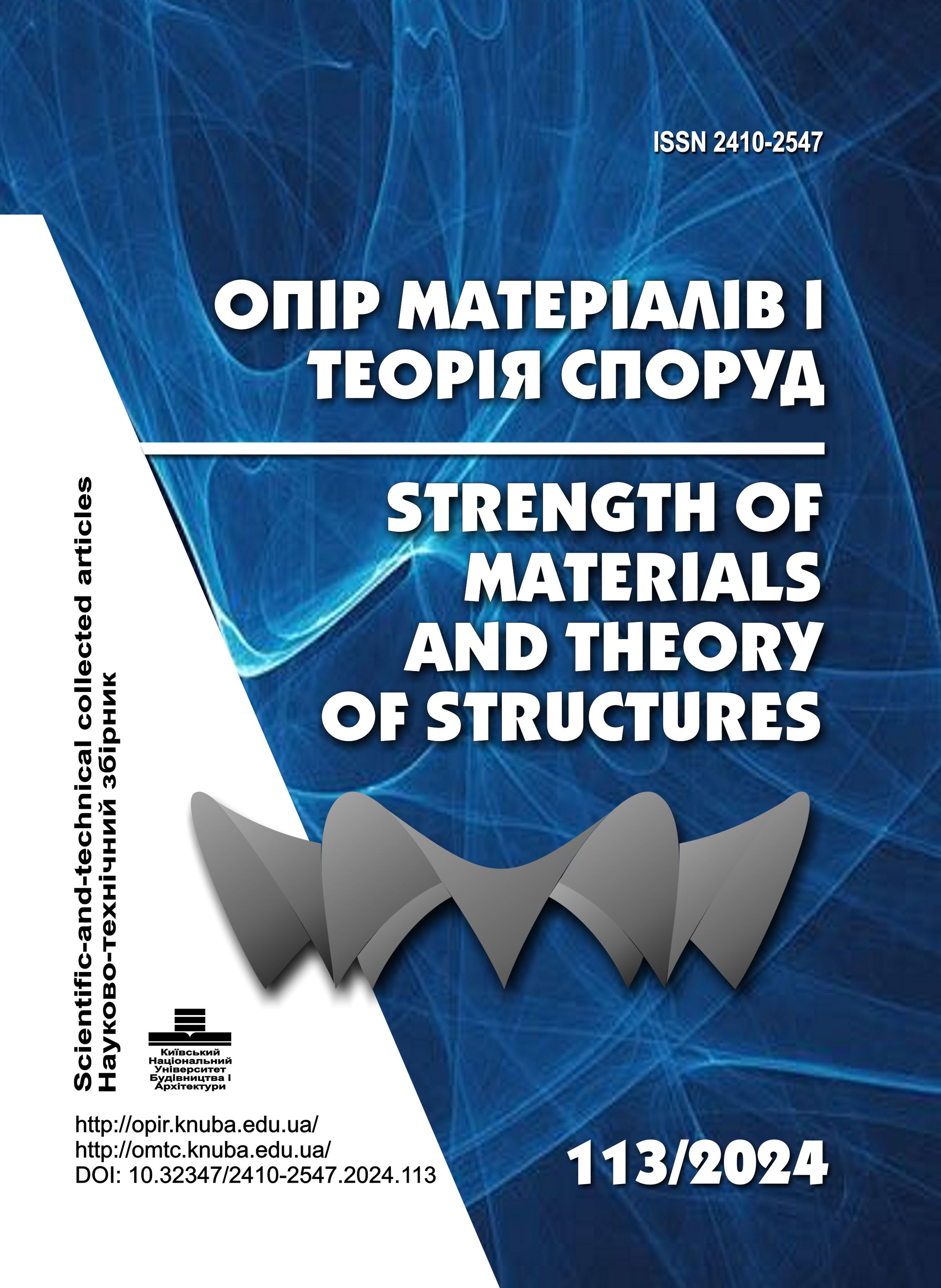Modal analysis of a thin coupled composite shell
DOI:
https://doi.org/10.32347/2410-2547.2024.113.75-80Keywords:
thin coupled shell, universal 3D finite element, natural vibration, fibrous unidirectional composite material, finite element methodAbstract
The results of the study of natural vibrations of a coupled shell of revolution are presented. The shell is a spherically biconical structure that has sharp bends in the mid-surface at the junction of different shapes. The material is a unidirectional fibrous carbon/epoxy composite. The shell structure, by its geometric shape and material parameterss, is an approximate model of the fairing of the launch vehicle. The modal analysis of a thin elastic shell is based on the use of a finite element model of a inhomogeneous shell and the application of a universal 3D finite element. The governing finite-element equations are constructed using a moment scheme of finite elements. The universal finite element is based on a standard isoparametric 3D finite element with polylinear shape functions for coordinates and displacements. It is characterized by the presence of additional variable parameters. Two nonclassical hypotheses are used to describe the features of the stress-strain state of a thin inhomogeneous shell. The static hypothesis of the constant of compressive stresses throughout the thickness of the shell layer is used. The kinematic hypothesis of deformed straight line is used, which is not necessarily normal to the mid-surface of the shell. The hypothesis allows us to join three-dimensional finite elements, keeping compatibility of the coordinates and displacements, and naturally modeling sharp bends. This phenomenon is inherent, for example, to folded and coupled (combined) shells. The performed modal analysis of the spherical biconical structure demonstrates the effectiveness of the method. Based on the universality of the approach, the method can be applied in studying the behavior of structures whose shell elements are made of different materials.
References
Etraim E., Eisenberger M. Exact vibration frequencies of segmented axisymmetric shells // Thin-Walled Struct, 2006. –44. – P. 281 – 289. https://doi.org/10.1016/j.tws.2006.03.006
Bespalova E.I., Boreiko N.P. Determination of the Natural Frequencies of Compound Anisotropic Shell Systems Using Various Deformation Models. // Int. Appl. Mech., 2019. – 55. – P. 41–54. https://doi.org/10.1007/s10778-019-00932-8
Kondratiev A.V., Kovalenko V.O. Optimizaciya proektnyh parametrov kompozitnogo golovnogo obtekatelya rakety-nositelya pri odnovremennom silovom i teplovom nagruzhenii (Optimization of design parameters of the main composite fairing of the launch vehicle under simultaneous force and thermal loading) // Kosmichna nauka i tekhnolohiya, 2019. – Т. 25, N 4. – P. 3–21. https://doi.org/10.15407/knit2019.04.003
Trocenko Yu.V. Sobstvennye kolebaniya sostavnoj obolochki «usechyonnyj konus-cilindr» (Natural vibrations of a composite shell "truncated cone-cylinder") // Zbirnik prac Ins. matematiki NAN Ukrayini, 2019. – T. 16, N 2. – P. 167–176.
Avramov К.V., Sakhno N.H., Uspenskyi B.V. Static Buckling of a Pre-loaded Complex Nano-composite Shell // Journal of Mechanical Engineering – Problemy Mashynobuduvannia, 2021. – Vol. 24, No 1. – P. 28-35. DOI: https://doi.org/10.15407/pmach2021.01.028
Emad Sobhani. On the vibrational analysis of combined paraboloidal-conical air vehicle segment shell-type structures // Aerospace Science and Technology, 2022. – Vol. 129. – 107823, https://doi.org/10.1016/j.ast.2022.107823.
Ifayefunmi O., Ismail, M.S., Othman M.Z.A. Buckling of unstiffened cone-cylinder shells subjected to axial compression and thermal loading // Ocean Engineering, 2021. – Vol. 225. – P.1–14. https://doi.org/10.1016/j.oceaneng.2021.108601
Xianjie Shi, Peng Zuo, Rui Zhong, Chenchen Guo, Qingshan Wang. Thermal vibration analysis of functionally graded conical-cylindrical coupled shell based on spectro-geometric method // Thin-Walled Structures, 2022. – Vol. 175. – 109138. https://doi.org/10.1016/j.tws.2022.109138
Bazhenov V.A., Krivenko O.P., Solovey M.O. Neliniyne deformuvannya ta stiykist pruzhnih obolonok neodnoridnoyi strukturi (Nonlinear Deformation and Stability of Elastic Inhomogeneous Shells). – K.: Vipol, 2010. – 316 s.
Krivenko O.P., Lizunov P.P., Vorona Yu.V., Kalashnikov O.B. Modelyuvannya protsesiv neliniynoho deformuvannya, vtraty stiykosti ta kolyvan pruzhnykh obolonok neodnoridnoyi struktury (Modeling the processes of nonlinear deformation, buckling, and vibrations of elastic shells of inhomogeneous structure) // Int. Appl. Mech., 2024. – Vol. 60, N 4. – P. 91–107.
Kalashnikov O.B., Krivenko. O.P., Lizunov P.P. Universalnyy tryvymirnyy skinchennyy element dlya rozrakhunku pruzhnykh neodnoridnykh obolonok pry termomekhanichnykh navantazhennyakh (Universal three-dimensional finite element for analyzing of elastic inhomogeneous shells under thermomechanical loads) // Strength of Materials and Theory of Structures: Scientific-and-technical collected articles. – K.: KNUBA, 2024. – Issue 112. – P. 93-107. DOI: 10.32347/2410-2547.2024.112.93-107
Krivenko O.P., Lizunov P.P., Vorona Yu.V., Kalashnikov O.B. Modelyuvannya termopruzhnykh vlastyvostey kompozytnoho materialu v zadachakh stiykosti bahatosharovykh obolonok (Modeling of thermo-elastic properties of composite material in stability problems of multilayered shells) // Management of Development of Complex Systems, 2023. – N 54. – P. 77–89. DOI: 10.32347/2412-9933.2023.54.77-89
Artyukhova T.P. Opredelenie kriticheskoj nagruzki poteri ustojchivosti golovnogo obtekatelya trehslojnoj struktury s uprugimi prodolnymi sharnirami (Definition of Critical Loading of Loss of Stability for Tree Layer Payload Fairing with Elastic Longitudinal Joints) // Kosmichna nauka i tekhnolohiya. Dodatok, 2001. – Vyp. 7, № 1. – S. 25–29.
Saharov A.S., Kislookij V.N., Kirichevskij V.V. i dr. Metod konechnyh elementov v mehanike tverdyh tel (Finite element method in solid mechanics) – K.: Visha shkola, 1982. – 480 s.
Chernobryvko M.V., Avramov K.V. Natural vibrations of parabolic shells (Natural oscillations of parabolic shells) // Matematicheskie metody i fiziko-mehanicheskie polya, 2014. – Vyp. 57, N 3. – S. 78–86.
Downloads
Published
Issue
Section
License

This work is licensed under a Creative Commons Attribution 4.0 International License.
Authors retain copyright and grant the journal right of first publication with the work simultaneously licensed under a Creative Commons Attribution License that allows others to share the work with an acknowledgement of the work's authorship and initial publication in this journal.

